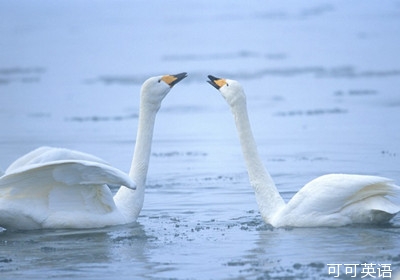In recent years, we've seen a big increase in the numbers of swans across the country. So some people feel that swans are becoming a danger to other river life. To answer this question, here is Paul from the Salmon and Trout Association.
近年来,我们看到整个国家天鹅的数量大幅增加。因此有些人感觉天鹅正在威胁其它的河流生命。为了解答这个问题,现在连线三文鱼和鳟鱼协会的发言人保罗。

What happens is the swans come along and in deep water, they just graze on it, that's no problem. It's quite resilient and it'll come back. The problem is in low water, they'll eat it right down to the roots and they'll kill it off. The problem here is more (that there is) not enough water in the river.
发生的情况是,天鹅来到深水区,以植物为食,这没问题。植被的生长具有反弹性,会复原。问题在于浅水区,天鹅会吃掉植物的根部,因而毁掉植被。更严重的问题是河流不再有足够的水。
Although it's difficult to believe that today with all this flood water coming down. That's the real issue. We need more water in the river to provide the depth for fish and birds to coexist side by side. Let's hear from Graham who works for the Royal Society for the Protection of Birds, RSPB.
尽管在洪水泛滥的今天,人们很难相信这个事实。但这是真正存在的问题。我们的河流需要更多的水来为鱼和鸟类的共存提供一定的水位空间。让我们来听听在英国皇家鸟类保护协会(RSPB)工作的格雷汉姆的意见。
The amount of water being taken out of the system is unsustainable, and also the amount of pollutants from washing achines and from farmland run-off coming into these rivers are also causing problems. So yes, let's look at the problems swans are causing, but let's look at the much bigger environmental picture too. That is historically the case, but these days all swans are protected under the wildlife and countryside act.
从水生系统流失的水是不可再生的,流向河流的大量洗涤和农田径流污染物也导致了这一问题。是的,让我们来看看天鹅造成的威胁,同时我们来看看宏观的环境现状。这是历史遗留下来的问题,所有的天鹅都属于皇室,它们都受到法律保护。












